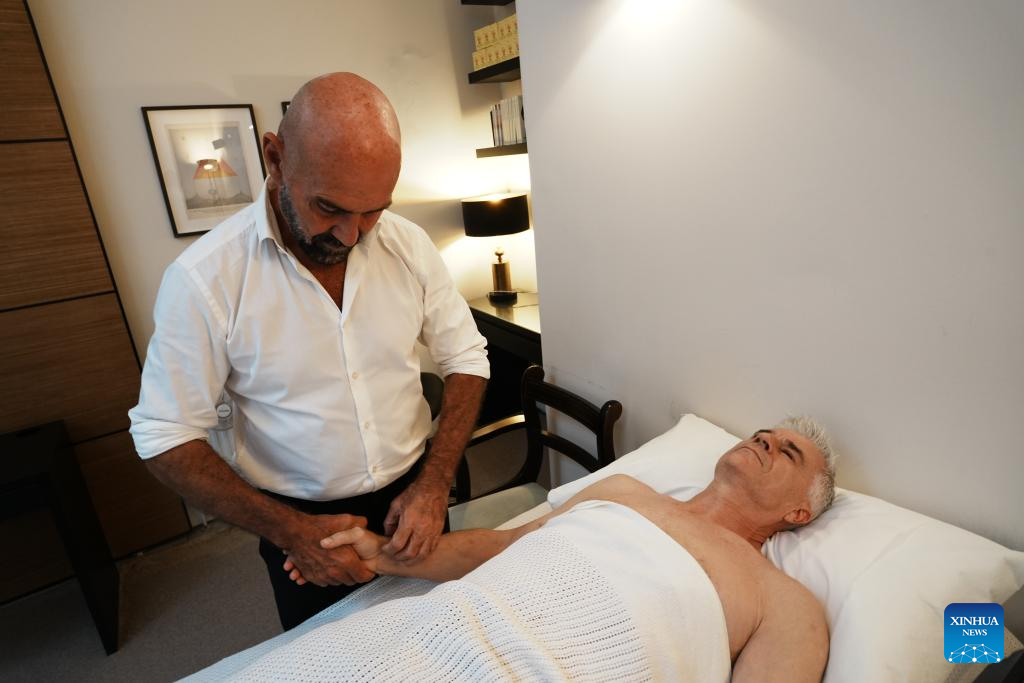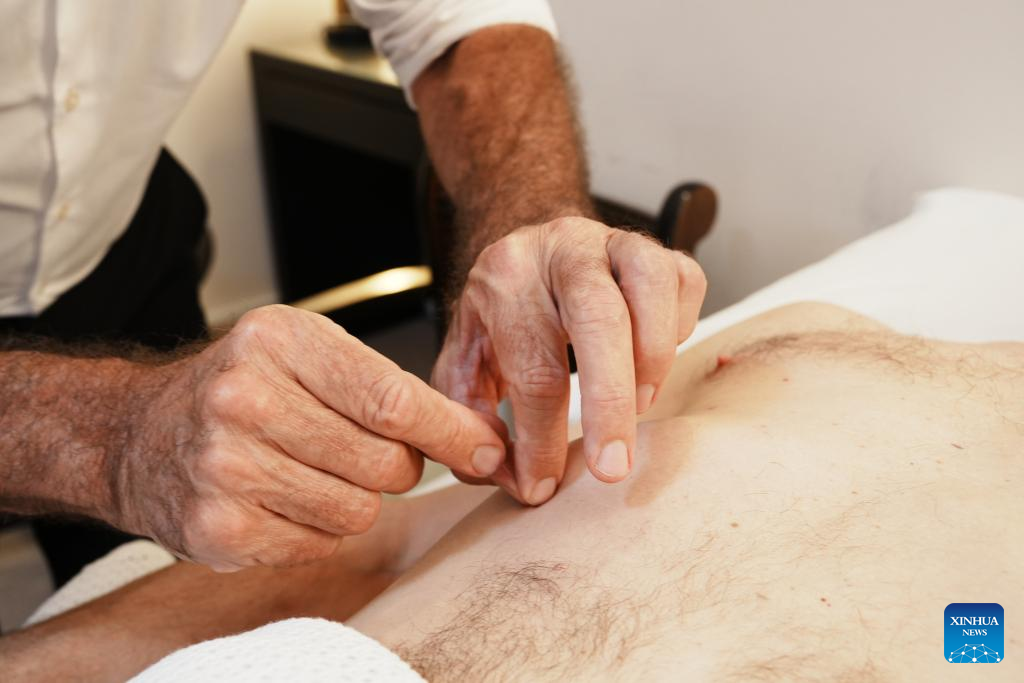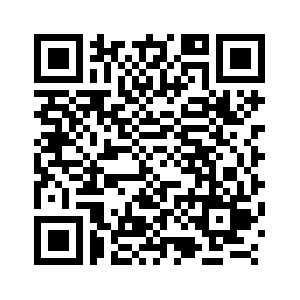Feature: British man promotes Chinese acupuncture in new book, treatments
Source: Xinhua
Editor: huaxia
2025-09-17 20:56:30

Acupuncturist Gerad Kite performs pulse diagnosis for James Eden, a film producer and also co-writer of his book "The Untapped Self," in London, Britain, Sept. 4, 2025. (Xinhua/Zhao Jiasong)
by Xinhua writer Zhao Jiasong
LONDON, Sept. 17 (Xinhua) -- When film producer James Eden first walked into acupuncturist Gerad Kite's London clinic seeking relief from stress, he knew little about Chinese acupuncture. Years later, the two Britons sat side by side before an audience, launching a new book on acupuncture that weaves ancient Chinese ideas of balance into stories for a modern and anxious world.
In their co-written book The Untapped Self published this month, Kite and Eden, aged 64 and 61 respectively, explain the philosophy behind Chinese acupuncture, introducing readers to concepts such as qi, Chinese pulse diagnosis and the network of acupuncture points, thus offering a glimpse into how these ancient ideas continue to shape modern approaches to well-being.
"Acupuncture is one of China's greatest cultural gifts to all of humanity," Kite said. "It offers a profound understanding of health that goes beyond symptoms, helping people find balance and harmony with nature and a return to good health."
Kite first encountered acupuncture in the 1980s when he lived in San Francisco. Under heavy pressure from work and life, a friend suggested he try it. "One treatment later, I woke up and felt completely different; I was so shocked at the Chinese way of treatment," he recalled.
He trained first as a psychotherapist, then returned to Britain to study acupuncture under the late J. R. Worsley, one of the first acupuncturists who introduced acupuncture from China to the West. Three and a half decades on, Kite has become a veteran acupuncturist and teacher, quietly building a bridge between Chinese ideas of harmony and Western lives that are, as he puts it, "too often locked in our heads."
Kite said the first Chinese book he read was the ancient classic Yellow Emperor's Canon of Medicine, through which he was introduced to five-element acupuncture.
According to Wang Jingjing, chief physician with the Acupuncture and Moxibustion Hospital of the China Academy of Chinese Medical Sciences, there are generally two major schools of acupuncture: one focuses on targeted symptom-based treatment, while the other emphasizes natural healing -- and five-element acupuncture belongs to the latter.
"It aims to correct imbalances within the patient's body, and its goal is to restore harmony, thereby promoting overall well-being," she said.
With such expertise, Kite established his clinic in central London in 1990. So far, he has provided around 50,000 treatments to patients and teaches about 50 students each year.
In the new book, he also shares the stories of 10 patients as case studies, illustrating the philosophy behind acupuncture and how it has helped them find a calmer and more balanced way of living.
"I hold deep respect and gratitude for China as the birthplace of this profound medical tradition that has been my purpose in life for over 35 years," he said. "It is inseparable from the wider body of traditional Chinese medicine and the philosophy of harmony it embodies."
He added that he also appreciates China's efforts to integrate traditional medicine with modern science.
"By supporting research and development, China is showing how ancient wisdom can stand alongside contemporary medicine. This ensures that the holistic vision of traditional Chinese medicine -- which treats the body, mind and emotional state -- remains alive, relevant and continually evolving," he said.
Eden came to Chinese culture from a different direction. A longtime meditation practitioner with a deep interest in Chinese philosophy, he spent six months at Wudang Mountain, a sacred Taoist site in China, studying Tai Chi and Kung Fu.
He said that his experience with traditional Chinese philosophy deepened his understanding of Chinese medicine and its approach to health, giving him a sense of duty to help share Chinese culture, a mission he now pursues in collaboration with Kite.
Eden is considering visiting China again, and so is Kite, who has not yet been to the country. "My teacher told me, 'Don't go to China until you've mastered this (acupuncture); spend your time with patients, learn how to do it, then go,'" Kite said, adding that he hopes to engage and exchange ideas with traditional Chinese medicine (TCM) doctors once he visits the country.
"The worldwide spread of TCM shows how deeply it resonates across cultures. People everywhere recognize its effectiveness and the wisdom it carries, whether through acupuncture, herbs or other practices," he said.
"It is a privilege to honor these Chinese roots while sharing their healing wisdom with people both here in Europe and around the world," Kite noted. ■

Acupuncturist Gerad Kite gives an acupuncture treatment to James Eden, a film producer and also co-writer of his book "The Untapped Self," in London, Britain, Sept. 4, 2025. (Xinhua/Zhao Jiasong)



